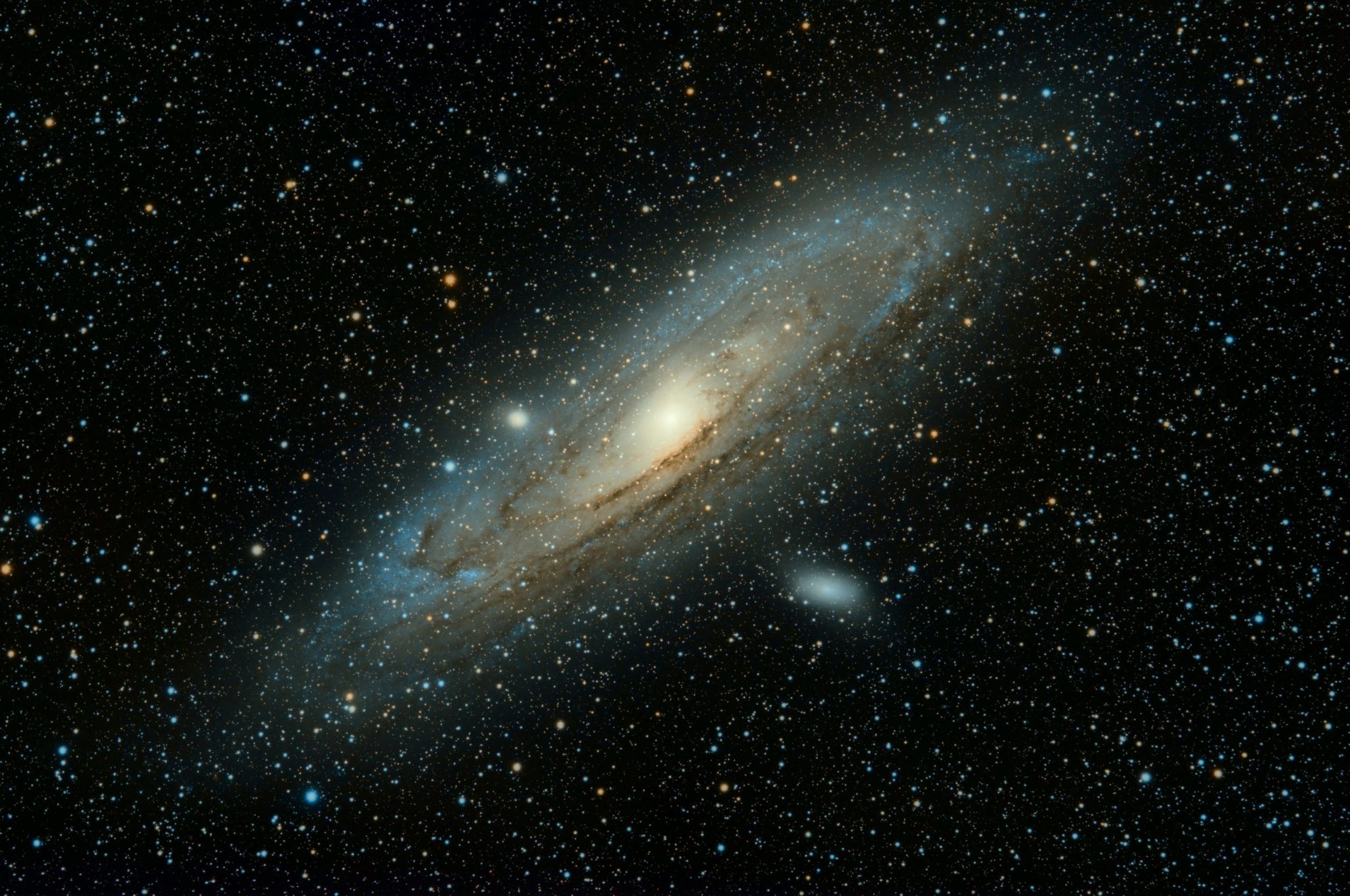Earlier last month, the Russian Space Agency informed its German counterpart of the intent to “hijack” an eROSITA X-ray telescope located onboard the Russian-German Spectrum-Roentgen-Gamma (SRG) mission launched into orbit from Baikonur, Kazakhstan, in July 2019.
The move comes amidst tensions over the conflict in Ukraine, which provoked the German Aerospace Center’s (Deutsches Zentrum für Luft- und Raumfahrt or DLR) March 2022 decision to ban Russia from further involvement in their joint X-ray telescope project. The telescope’s developer — the Max Planck Institute — subsequently initiated the device’s safe mode function, pausing the instrument’s scientific operations and rendering its processing codes, proprietary and observational data of astronomical phenomena out of reach to Russian scientists. This is no small matter, as the shutdown complicated the functioning of the secondary Russian X-ray telescope, the ART-XC, which is directly dependent on eROSITA’s operations.
While the eROSITA telescope was designed by Germany’s DLR and the Max Planck Institute, it was assembled and launched into orbit by Russia’s Federal Space Agency (Roscosmos). The instrument itself is German but its assembly, testing, and delivery into orbit along with the Russian-built ART-XC partner telescope had been made by Russian specialists. The two sophisticated hardware pieces — mounted onto the joint Russian-German “Spectrum-Roentgen-Gamma” (SRG) orbital observatory some 1.5 million kilometers away from Earth — is part of an international cooperative space research and technology demonstration mission formalized by a Memorandum of Understanding signed between DLR and Roscosmos in March 2007.
Despite heated diplomatic exchanges and ideological contests during one of the more significant periods for space exploration during the Cold War, operations in that domain remained largely unaffected. Why is the Russian-Ukrainian conflict having such a disproportionate impact on inter-state spatial relations today? Is it a harbinger of the contours of space wars and space diplomacy to come? Or have risks to space architecture and its accompanying terrestrial cyberspace counterparts become too severe to ignore during conflicts? Lastly, what does the incident illustrate about the inadequacies of the legal regimes and diplomatic instruments in place that ought to be readily called upon in times of open armed conflicts and political controversies on Earth and in outer space?
THE CONUNDRUMS
The telescope’s political debacle may well be the first in a series of high-profile incidents that will dramatically restructure our thinking around the questions of ownership, claims of responsibility, legal liability, and security of objects and interests in outer space. It is worth recalling the complex web of collaborative scientific research endeavors that make space exploration in general, and eROSITA’s operations in particular, possible. Applying legal accountability and liability mechanisms to such international missions, especially in times of strained political relations is difficult. Moreover, the interconnected endeavors might easily resist straightforward punitive solutions.
What might constitute an act of aggression, terrorism, piracy, or a hijacking in outer space remains shrouded in a fog of legal ambiguity. And the legal ambiguity favors prospective perpetrators.
The Spektr-RG was initiated as a Russian project with the participation of Germany. During the MAKS International Aviation and Space Salon in Moscow, the Russian Federal Space Agency and the German Aerospace Center signed an agreement of cooperation, organization, and technical collaboration on Aug. 18, 2009. The German and Russian partners agreed to each receive 50% of the data generated by the eROSITA telescope. The Russian side claimed 100% of the Russian-made ART-XC data with 0.5% of that data being accessed by the United States due to its manufacture of the telescope’s mirrors.
The eROSITA telescope’s software development and mission are supported by an array of international institutional and industrial partners. The German and Russian research institutes constitute the bulk of institutional partnerships, while the industrial core that fitted the instrument with high specification optical systems and mechanical and electronic components and subsystems had been provided by Austria, Germany, and Italy. Ground segment and software development teams and near real-time data analysis are managed almost exclusively by German astronomical and astrophysical institutional partnerships.
The unprecedented move by DRL to terminate collaboration on Mar. 3, 2022 with Russian Roscosmos and allied institutions on current and forthcoming projects, including the eROSITA project, has provoked considerable Russian ire. The decision, however, was reached against the backdrop of the aggressive attack on Ukraine and may jeopardize Russia’s cooperation with other national and international partners on similar projects.
The same day, in a diplomatic tit-for-tat, Roscosmos announced that it was ceasing cooperation with Germany on science experiments aboard the International Space Station. Undeterred by the ban, Roscosmos chief Dmitry Rogozin gave orders to restore the telescope’s operations without seeking Germany’s permission, an act the international press characterized as a “hijacking.”
Germany’s unilateral decision to switch off the German-Russian scientific venture used for peaceful exploration of far-off galaxies and supermassive black holes due to the ongoing conflict between Ukraine and Russia not only thrusts space once again into a dramatic theatre of international space competition but raises several vexing legal and political problems.
EXISTING LEGAL GUIDANCE
International space law consists of five international treaties overseen by the UN Committee on the Peaceful Uses of Outer Space and include: The Outer Space Treaty (1967), the Rescue Agreement (1967), the Liability Convention (1971), the Registration Convention (1974), and the Moon Agreement (1979).
International treaty and convention law permits scientific exploration of space, forbids sovereign ownership of space and heavenly bodies in the spirit of res communis, and prohibits the placement of weapons of mass destruction in space. However, according to the George W. Bush administration, lower-grade defensive weapons systems, such as space-based lasers or anti-missile missiles, were not included in the ban.
The 1971 Convention on Liability and the 1976 Convention on the Registration of Objects exist to ensure that precautionary measures be taken by states and international intergovernmental organizations involved in the launching of space objects and in the event of damage recognize the entitlement to compensation of victims of such damage. The Registration Convention affirms the Outer Space Treaty’s stance, which holds that signatories bear international responsibility for their national activities and objects registered and launched into outer space.
There is an expectation that countries undertake appropriate consultations before proceeding with acts that might interfere or be harmful to other state parties’ exploration of outer space under Article IX of the Outer Space Treaty. State practice, however, suggests a high threshold of harm before an obligation to engage in international consultations could be activated. Thus far, states — including China, India, and Russia — had failed to initiate international consultations when testing their anti-satellite missile systems on satellites or creating significant space debris.
Likewise, legal liability for damage caused by space objects on the surface of the Earth or to aircraft in flight, whilst addressed by the Liability Convention of 1971 has not been created in the spirit of forward-looking international criminal law, which takes intentional acts of state sabotage, terrorism or hijacking into account. It instead defines “damage” as “loss of life, personal injury or other impairment of health; or loss of or damage to property of States or of persons, natural or juridical, or property of international intergovernmental organizations.” It also provides remedies and procedures for the settlement of claims for damages, including a settlement of disputes through diplomatic channels.
This area of law is separate and distinct from the procedures established with regard to potential criminal behavior or violations committed on the International Space Station, where the Intergovernmental Agreement on Space Station Cooperation — signed on Jan. 29, 1998 by the 15 governments involved in the Space Station project, including, Canada, Europe, Japan, Russia, and the United States — defines the rights and obligations of each of the countries and their jurisdiction and control with respect to their Space Station elements.
Without a clear demarcation line, however, between airspace and outer space and the establishment of a clear jurisdictional area along with a list of crimes subject to legal arbitration of state entities and individual persons, it is unlikely that hijackings of objects (satellites, spaceships, space stations and the like) in outer space or misfiring of rogue rockets onto the moon’s surface could be precisely modeled on laws presently outlawing air hijackings or sea piracy or broadly regulating state conduct in air and the high seas.
THE NEED FOR INTERNATIONAL OUTER SPACE CRIMINAL LAW
On Sept. 14, 2021, at the 2021 Defence and Security Equipment International conference in London, the head of the United Kingdom’s new Space Directorate Air Vice Marshal Harvey Smyth warned that the lower cost of access to the space domain increases the possibility of “space terrorism.”
Apart from rogue regimes intent on destabilizing or disrupting satellite capabilities, it is not beyond the realm of the conceivable that transnational criminal actors and criminal or terrorist organizations could also seek access to the space domain to achieve their own limited interests. As space “is becoming more contested and congested,” according to Smyth, it is also the realm that is capable of delivering one of the first “dramatic strategic shock[s]” in the grey zone, hybrid war, and space terrorism situations.
Beyond a normative framework discouraging actions “designed or likely to provoke or encourage any threat to the peace, breach of the peace, or act of aggression,” none of the treaties, conventions, and principles to date, provide law and legal guidance or enumerate prospective crimes that states and non-state entities (including corporations, illicit organizations, and academic research institutions) might plausibly (intentionally or incidentally) commit against each other’s interests or objects in outer space. Current laws also don’t spell out conditions that must be met to achieve the threshold for criminal as opposed to civil liability much less provide provisions for what might be regarded as acts of war, war crimes or crimes of aggression in space. For obvious reasons, core international crimes or atrocities that shock the conscience of humankind neglect to identify the strikingly reprehensible criminal acts that might be perpetrated in the extraterrestrial realm. The 20th century international legal guidance based on principles of sovereignty and nationality lags behind the 21st century capabilities as humanity dreams up space tourism and intensifies commercial and military space engagement.
What might constitute an act of aggression, terrorism, piracy, or a hijacking in outer space remains shrouded in a fog of legal ambiguity. Would any of the above crimes reach the threshold of a crime against humanity or a crime against peace? Legal ambiguity in this regard favors prospective perpetrators. The acts with exceptionally high impact and bearing on national security as pertaining to occurring in outer space are far from being a well-settled international law and even further from being regarded as universal crimes or ius gentium.
As the eROSITA satellite’s potential state “hijacking” incident illustrates, international outer space criminal law is urgently needed. Is it not an appropriate time to start updating our legal lexicons and articulating the scope of criminal behavior in outer space? If not now, when?
Joanna Rozpedowski is a non-resident senior fellow at the Center for International Policy and international law scholar based in Washington, DC.














